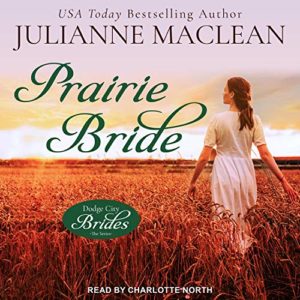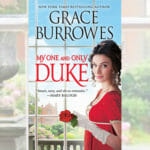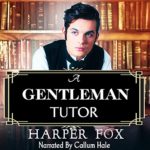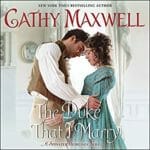Narrated by Charlotte North
The mail order bride trope is a common one in Western Historical Romance, but up until now, I haven’t actually read or listened to one. When Julianne Maclean’s Prairie Bride – book one in her Dodge City Brides series – showed up with the excellent Charlotte North listed as the narrator, I decided it was time to give one a go.
Even though I have no direct experience with this trope, I’ve been around Romancelandia long enough to have been able to make a reasonable guess as to what the story would be about – and I was pretty much spot on. A young woman running from her past travels from the city to the back of beyond to marry a man she’s never seen, doesn’t expect quite the primitive standard of her new home but decides to make the best of it, falls for her husband (who is, fortunately, hot as hell) her past catches up with her, drama ensues – The End.
If by that you infer that the story is predictable – then you’re inferring correctly.
Sarah MacFarland answers an advertisement in a Boston newspaper for a “gentle and peaceful wife for simple life on Kansas prairie. Must agree to toil and plain home.” – and decides it’s both the perfect way to escape from her recent mistakes and to achieve her lifelong dream of husband and family. Right from the off, it’s clear she’s running from something – someone – and when she hopes her husband will forgive her “for deceiving him on their wedding day”, it’s fairly clear what sort of mistake she’s made.
Arthur Brigman – who doesn’t like being called by his first name and goes by Briggs – has advertised for a wife as much because he needs help around his farm as because he wants companionship and someone to share his bed. His brother George – who works as a solicitor in Dodge City – isn’t wild about the idea; Briggs has only recently been jilted by the woman he’d intended to marry and George thinks taking a wife right now is a bad idea. But Sarah is on her way now, so it’s too late to change his mind – even if Briggs wanted to, which he doesn’t. Isabelle was clearly unsuited to the simple, but hard life on the prairie; he hopes the “gentle and peaceful” woman who answered his advertisement will be nothing like her. A plain, healthy (and hopefully strong) woman who isn’t bothered about fancy clothes and hats is exactly what he wants, so when a lovely young woman attired in a stylish dress and hat steps off the train, Briggs is… not happy.
The wedding goes ahead at the courthouse, the wedding night ensues, and of course Briggs discovers his new wife isn’t a virgin. He doesn’t throw a hissy fit, which is a point in his favour; he’s not particularly bothered, until he asks Sarah about her previous lover(s) and she responds by telling him there was only one, and that she loved him (because she doesn’t want Briggs to think she’d have slept with him if she hadn’t been in love.) It’s that part Briggs objects to; his new wife was with another man just three weeks before and for all he knows, is still in love with him.
As I said above, the story hits all the expected beats. Sarah tries hard to keep her disappointment at her new home – a one-room dugout – from showing, but sensing Briggs’ disapproval of her, sets out to prove to him that she can cope with it all. She’s not completely helpless; she knows how to cook and make a fire and other useful practicalities, but Briggs is still peeved at the thought of his wife being in love with someone else, and doesn’t offer any help at all, not even telling her where the fuel for the stove is stored. He might be rugged and handsome and all man, but he acts like a big baby.
Eventually, Sarah’s gumption, her spirit and her eagerness to please cause Briggs to realise he’s been a brat and that she’s trying her best in difficult circumstances, and they start to get along better. Severe adversity (in the form of a plague of locusts that destroys their crops) brings them closer, but Sarah is still holding a potentially devastating secret, and Briggs hasn’t been completely up-front with her, either.
Most romances are predictable; we know where things are going to end up, so they’re about the getting there more than the eventual outcome. The best romances are those in which authors take a well-worn trope and make something new out of it, but sadly, that isn’t what happens here. The first half was okay, as Sarah and Briggs are circling around each other and Sarah is finding her feet, but the romance never really gets off the ground; there are so many misunderstandings and there’s such a lot of distrust between the couple that it’s hard to believe they could ever fall in love – and worse, the hero is a dickhead most of the time. Sarah keeps secrets but gets annoyed with Briggs for not trusting her (when she has ample opportunity to tell him the truth) and towards the end, Briggs in a self-pitying drunken stupor does something so completely stupid and unkind that it torpedoed my (admittedly small, by this point) interest in the romance. The villain is little more than a two-dimensional moustache-twirling cape-swisher, and the only things saving this story from a lower grade are the evocative descriptions of nineteenth century prairie life.
Charlotte North is an excellent narrator, and her performance is really what kept me listening for the whole seven-hours-plus of this audiobook. Her mezzo-range voice is smooth and pleasant to listen to, her pacing and vocal characterisations are good, and she differentiates effectively between all the characters. The secondary cast isn’t large, but each member is distinct from the others and her male voices are especially good. It’s an expressive performance that’s imbued with just the right degree of emotion – I just wish she’d had better material to work with.
My first mail-order bride romance was therefore not a success, and I can’t commend Prairie Bride for anything other than the narration.
Caz
Buy Prairie Bride by Julianne MacLean on Amazon





The mail-order bride story that sticks in my mind is LaVyrle Spencer’s The Endearment. It’s unique because the heroine is hiding a big secret and at first isn’t a likable or trustworthy character. But Spencer is able to write a believable and emotional redemption story here and I rated it an A- when I read it ten years ago. I don’t have a great memory for story details, but this one stuck with me, so that says something.
Nice review, Caz. I wasn’t aware you hadn’t read or listened to a Western mail order bride story before. It’s too bad your first experience with the trope turned out to be so run of the mill.
If you’re willing to give the trope another chance, I enjoyed Beverly Jenkins’s Tempest. It’s part of a series of Westerns she did but stands alone pretty well.
On that note, I’m really disappointed that Harlequin Historical ceased production of Westerns as of 2019 with no plans of opening that era up again. Is the subgenre simply passé, or are they afraid of some of the controversies surrounding the era? I’m not a huge Western fan, finding the genre to be hit and miss, but I do like the occasional journey out into the Wild West where women had more independence than their counterparts Back East and characters with diverse and/or shady pasts mingled somewhat freely.
It’s a genre I never really thought about, tbh. I’m sure there are better ones about, but so few historicals are working for me right now, I’m not in a rush to try another one.
I really enjoy Charlotte North narrations too Caz. I’m glad at least that worked for you!
I’ve only listened to her a handful of times, but she’s really good – one of the few American female narrators I enjoy listening to!
Why don’t you like American female narrators? Just curious. :-)
Some of the younger ones are too Valley Girl? And always sound like they’re asking a question? In general, I don’t tend to enjoy listening to narrators at the soprano end of the range; I find their voices lack depth and tone-colour; give me a mezzo or contralto every time – they tend to have more “room” in their range to manage a decent male voice, too. Many of them sound so similar, I couldn’t pick a specific one out of a line-up.
Thanks! I haven’t listened to as many, so I haven’t categorized what I like to that detail. I just know when I don’t like something? If that makes sense. And I know some things are very subjective. Recently I listened to a book I got in an Audible sale narrated by Anna Bentinck. Her narration was praised by most listeners, but I didn’t enjoy her. I just put that down to individual preferences.
I realize I don’t listen to many American female narrators because I don’t listen to much contemporary romances. I did love Anna Fields back in the day, though.
I reviewed that one here (A Bachelor Establishment) and liked the narration – she’s no Kate Reading, but it was more than decent. I think one of the reasons I don’t listen to more contemporary romance is because I’m just not a fan of female narrators. There are such fabulous men narrating contemps – Joe Arden, Jason Clarke, Shane East, Zachary Webber, Teddy Hamilton (thankfully, he does the odd m/m as well, so I do get to listen to him a bit more!) and others – but I rarely listen to them partly because either the stories don’t appeal, the other narrator doesn’t, or I worry they’re paired up with someone who is nowhere near as good as they are. There are a handful of female narrators I don’t mind listening to – Andi Arndt, Charlotte North, Brittany Pressley, Carly Robins, Nicol Zanzarella for instance, but so many of them just sound the same :(